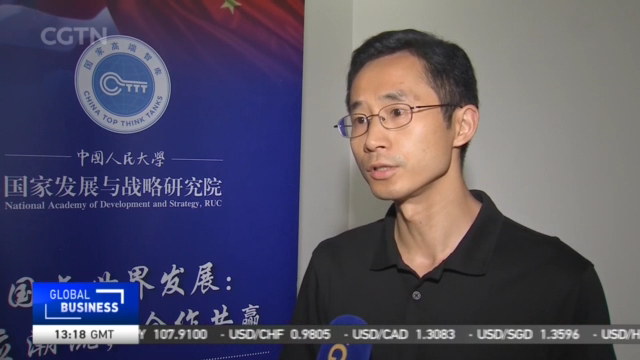
21:57, 22-Jul-2019
US-China Trade Relations: China, US need 'rational voice, new strategic consensus'
Updated
22:10, 22-Jul-2019

A new seminar in Beijing aims to patch up China-US trade relations in a more realistic way. The event, entitled "Development of China and the World: Follow the trend and achieve win-win cooperation", has attracted economists, scholars, and foreign relations experts. They say the two countries need a rational voice, and a new strategic consensus. Here's CGTN's Liu Yang.
It's not a debate, but full of rational pieces of evidence analyzing the current situation between China and the US.
One scholar at this Beijing round table event says China fully upholds international order, which discredits the US's notion that China is a 'destroyer' or 'revisionist'. Earlier this month, over 100 US economists, foreign relations experts and others signed an open letter to US President Donald Trump and members of Congress. It was entitled 'China is not an enemy,' and called for a rational voice to handle US-China relations. Those signing the letter feel that US-China relations need a new strategic consensus.
GAO FEI,VICE PRESIDENT CHINA FOREIGN AFFAIRS UNIVERSITY "To a large extent, the difficulties between the two are caused by unilateralism and self-interests of one country. Great-Power diplomacy should not be hijacked by populism and nationalism. China and the US should meet each other halfway and find a common path."
Many at the Beijing seminar point to China's 'enormous' contributions to technological development and trade. They say different visions of international order between the two nations are undermining the stability of bilateral relations. China and the US are advised to strengthen dialogue on their ideas of international order.
WANG HONGGANG,DIRECTOR INSTITUTE OF AMERICAN STUDIES "China will certainly not pursue hegemony in this process of development. This is not a commitment we have made to one particular country. In ancient Chinese culture, bullying one's self was a relatively low-level form of international relations and a strategic choice. Instead, we should pursue a global network of partnership."
LIU QING,PROFESSOR RENMIN UNIVERSITY OF CHINA "Perhaps more than 90 percent of the world's technological progress comes from international technology diffusion. China's tech breakthroughs have also spread to other countries, and brought benefits to them. We can see that in rural areas of the US, about a fourth of all communication devices are probably made by Huawei, and Huawei provides about 70 percent of the network in Africa."
In reports published late Sunday, China and the US are implementing the important consensus reached by their leaders during the G20 Summit in Osaka. Some Chinese companies have asked US exporters about their purchases of agricultural products, and applied for tariff exclusions on imports from the US. Chinese officials say they hope the US will work with them in meeting commitments. Liu Yang CGTN, Beijing.
SITEMAP
Copyright © 2018 CGTN. Beijing ICP prepared NO.16065310-3
Copyright © 2018 CGTN. Beijing ICP prepared NO.16065310-3